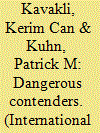| Srl | Item |
| 1 |
ID:
171169


|
|
|
|
|
| Summary/Abstract |
How do international observers decide whether to criticize or condone electoral fraud in a country? We argue that this decision depends on the identity of the victims of electoral fraud. A monitoring organization is more likely to overlook fraud committed against groups that are deemed dangerous by its sponsor. Based on this insight, we hypothesize that in the post-Cold War era election monitors are more tolerant of fraud against Islamic challengers, especially when Islamic movements are perceived as a threat to political stability. In support of our hypothesis, we find that outside monitors are more likely to endorse an election in countries with an Islamic opposition party and an ongoing Islamist terrorist campaign. Furthermore, we find that the effect is driven by Western monitoring organizations and becomes stronger after the September 11 attacks. Our findings provide a simple yet powerful insight: the calculus of outside observers depends not only on who they wish to see in power, but also who they want to keep from power.
|
|
|
|
|
|
|
|
|
|
|
|
|
|
|
|
| 2 |
ID:
192887


|
|
|
|
|
| Summary/Abstract |
In recent years, there has been much research on foreign electoral intervention (FEI). However, it is an open question as to whether successful interventions “work” for the intervener. Does the newly elected government adopt the policies that motivated the intervener to intervene in the first place? This paper makes a first step toward addressing that question. It argues that FEIs work when the elected government can overcome veto players in legislatures, be they parliaments, national assemblies, or congresses. For minority governments or cohabitational presidencies, overcoming these veto players is no easy task and may necessitate further interventions by the intervening power. American interventions in the Canadian elections of 1962 and 1963 serve as an illustrative case. The findings suggest that governments with large majorities or control over congressional/legislative branches are more likely to cooperate with intervening governments. These findings have implications for how we assess the vulnerability of democracies to FEI.
|
|
|
|
|
|
|
|
|
|
|
|
|
|
|
|